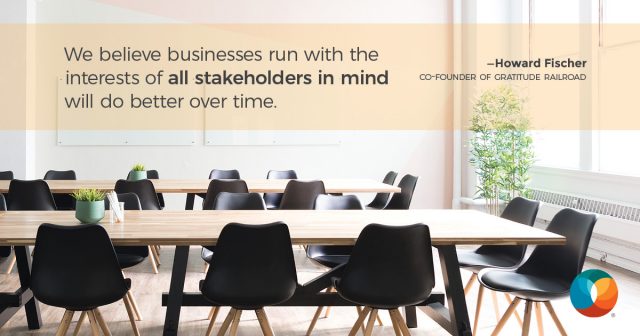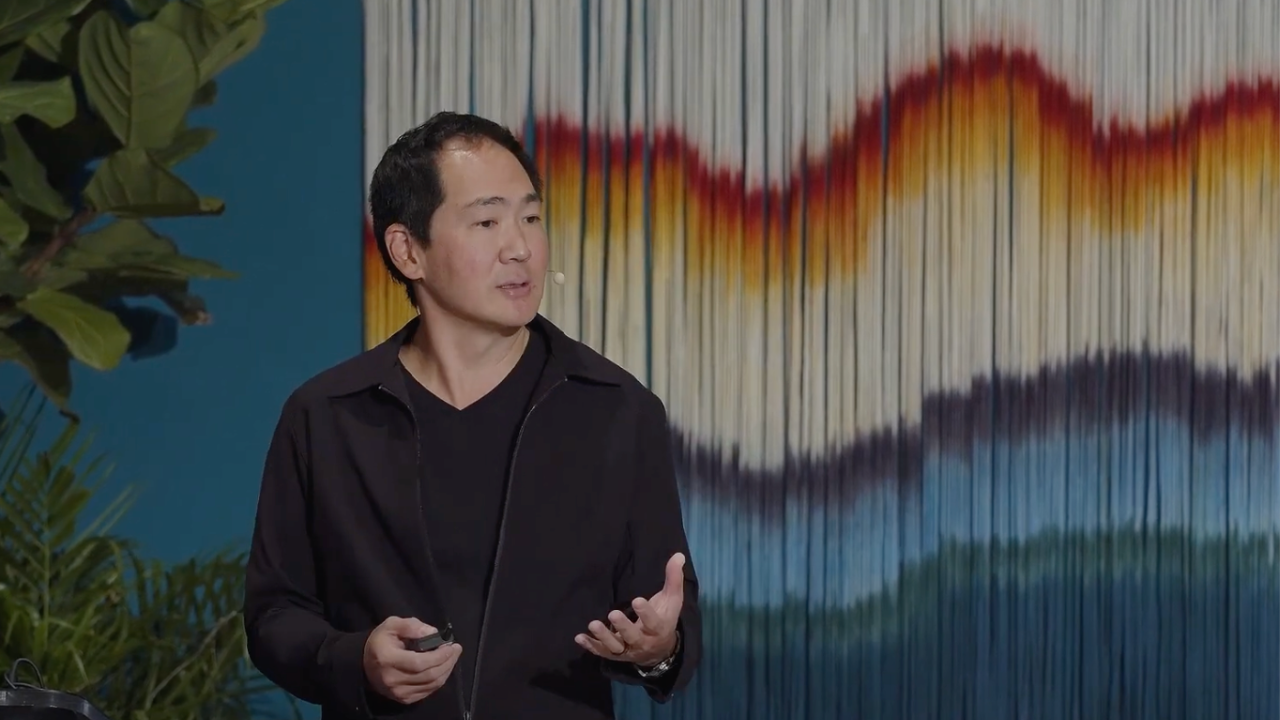Not All Money is Created Equal:
The importance of funding businesses with conscious capital
There comes a time in the life of a business when it needs money to grow—and while money can be fuel, it can also be fire. Investors come with strings attached, and business owners who understand the power of companies to change the world for the better are choosing their sources of funding with increasing care.

Old and new businesses alike raise money for a variety of reasons—to expand services and offerings, invest in infrastructure, open new locations, or develop new products. Small manufacturers in the Midwest take out loans from regional banks, brand name retailers partner with private equity firms, while tech start-ups in Silicon Valley look to venture capital funds.
These billions of dollars available as sources of funding have one thing in common. The financiers who control them are increasingly putting their money to work for businesses that strive to make the world a better place. This is in part a reaction to the values of the Millennial generation, which believes what Conscious Capitalists have known for a long time—that a business built to benefit everyone and exploit no one, has the best potential to creating lasting wealth and value.
“I fully believe that 20 years from now, all business will be purpose-driven,” said William W. Vogelgesang, co-founder of EPOCH Pi, which provides investment banking services to conscious companies. Noting that even old-line firms like the Campbell Soup Company are moving toward a purpose-based model, he added, “Millennials are going to drive all business in that direction.”
Eric Jacobsen, co-founder of Gratitude Railroad, a conscious investment firm, said he believes the time is right for the Conscious Capitalist approach to funding. “Business has been naturally evolving to be more conscious for the last 150 years—that has been the trajectory. We can push it faster if we work at it.”
It’s no secret that younger generations are far more interested in working for companies they feel aligned with.
“Things are changing as Baby Boomers pass away,” said Howard Fischer, Jacobsen’s partner and co-founder at Gratitude Railroad. “Increasing numbers of people are interested in the ‘Lifestyle of health and sustainability’ (LOHAS), and Millennials are more interested in the environment and doing good.” They make their values known by voting with their purchasing decisions and where they choose to work.
Fischer added that he believes the conscious approach to business is also the most profitable.
We believe in the tenets of Conscious Capitalism. We believe businesses run with the interests of all stakeholders in mind will do better over time.
Howard Fisher
Currently, Fischer manages about $1 billion in assets at his NY-based hedge fund. Jacobsen, who runs a private equity firm, manages around $500 million. Together they started Gratitude Railroad in 2013 as a vehicle to catalyze investment professionals to use their funds to solve environmental and social problems. This approach creates a ripple effect far beyond what could be achieved by operating out of a single fund, and they have already facilitated the movement of hundreds of millions of individual investor capital dollars into conscious investments. Gratitude Railroad hopes to lead the way in proving that top-tier returns are more likely when capital is focused on making a difference.

Image Credit: NeONBRAND
Vogelgesang, Fischer, and Jacobsen are part of a new wave of financiers bringing consciousness to the investing world. Another driver of this encouraging trend is Jeffrey L. Cherry, founder of the Conscious Venture Lab, which runs boot camps for socially conscious businesses. Through the Conscious Venture Fund, managed by his New York-based The Porter Group investment firm, Cherry also invests in companies, providing cash and a Conscious Capitalism training program.
In an interview with the Baltimore Sun, Cherry said he wanted to influence the way capitalism is practiced.
“We’re essentially trying to create a different type of accelerator and a different type of venture capitalism,” he told the Sun.
He added: “We know there are billion dollar ideas all over the place. There are smart people everywhere. There’s just not equal opportunity everywhere.”
Although conscious finance is in its relative infancy, there are already some success stories.
Sunny Vanderbeck, managing partner at Satori Capital, a conscious investment firm, recalled how one of its manufacturing companies was suffering because of a micro recession in its industry. The company had a handful of major competitors, including a couple that were publicly owned. When industry revenues fell by half, the board of directors knew that the public companies were going to lay off employees.
“But our analysis showed that when the industry bounced back, there would be a severe undersupply in the market,” he said. “We could have done layoffs and had much higher profitability. But we also knew that when the recession ended, the industry would come back with a fury.”
Instead, the company kept everyone on the payroll, ensuring it had a trained, motivated workforce when the market improved. When it did, the company grew in revenue from $60 million to $200 million in two years, achieving market share at the expense of competitors.
But it was tough. We took a hit for more than a year.
Sunny Vanderbeck
Another Satori success is its 2015 divestiture of FWT, a Fort Worth-based manufacturer of steel structures for electricity transmission. During the period Satori held the company, FWT’s leadership team emphasized value creation for all stakeholders. They opened a plant in an area that served the customer well and created jobs through a public-private partnership, created a welding school to help employees develop their skills, and worked to reduce waste and per-pole environmental impact. In the end, FWT generated financial returns for Satori’s investors that significantly exceeded ordinary returns. A typical private equity internal rate of return (IRR) is twenty percent, and Satori achieved more than double that, before fees.
Traditional investors are beginning to take notice.
“All the big banks have some kind of sustainable finance initiative,” Vogelgesang said. “They’ve seen that more and more people with wealth want to invest in alignment with their values.”
Many investors, however, still worship at the altar of short-term shareholder returns.
For example, when American Airlines proposed pay raises for pilots and flight attendants worth about $1 billion over three years, the response of the investor community was sharply negative. In a widely quoted note to clients earlier this year, Citi analyst Kevin Crissey wrote: “This is frustrating. Labor is being paid first again. Shareholders get leftovers.”
Jacobsen said such a view is short-sighted.
“One hundred years ago, capitalists believed that if you paid workers ten cents more an hour, you’d have ten cents less for profit,” and he’s quick to note that such zero-sum thinking contributed to horrid workplace conditions, and is not aligned with true capitalism. “Over the last 100 years, they’ve learned that if they treat their employees well and with respect, many benefits accrue.”
Those benefits include reduced employee turnover, fewer lawsuits, and better recruitment, all of which lower costs and mean better overall product quality.
True capitalists today know that there are many advantages that are hard to measure on a short-term expenses spreadsheet.
Jacobsen
But lingering focus on short-term results means Conscious Leaders have to be especially careful in selecting investors.
In early 2017, Whole Foods co-founder and CEO, John Mackey, had some pointed advice for his colleagues at Conscious Capitalism’s annual spring conference in Philadelphia:
“Evaluate your investors very carefully,” urged Mackey. “If you don’t choose the right partners, there will be a steep price to pay. Your dream and your company can be shattered.”
Thirty-six years after becoming the cornerstone of the organic and natural food movement in the U.S., activist investors threatened to sweep the rug out from under the retail giant.
Two months later, Amazon purchased Whole Foods.
While some had concerns that the sale was the death knell for the Conscious Capitalism movement, businesspeople understand this was a problem of how a business was funded, not a flaw in capitalism itself. Mackey struck a deal with Amazon for funding that he believed would be more conscious, and would allow Whole Foods to continue to expand its mission to elevate all the communities it is a part of.
Conscious Capitalism Inc. CEO Alexander McCobin noted that the reason Amazon agreed to pay a premium for Whole Foods was because of the organic retailer’s Conscious Capitalism ethos.
Adding that Amazon was recently named the world’s No. 1 most innovative company by Fast Company, McCobin said, “This could be the perfect marriage.”
Regardless of how the Whole Foods purchase turns out, Fischer believes Conscious Capitalism must succeed. He worries the planet is dying and income inequality is growing, phenomena he lays at the feet of unconscious capitalism.
“It’s important to me that we save the planet and mankind,” he said. “If we don’t fix these things, we’ll have death, dislocation, and revolution.”
Of course, even the most ardent believers in this emerging financial trend understand that results are not necessarily guaranteed for all conscious companies.
“Conscious businesses will have successes and failures,” Jacobsen said, noting that consciousness does not exempt them from capitalism’s laws. For example, a food company that treats its employees and community well will have trouble raising funds if its food tastes bad. And it will probably fail, notwithstanding how it pays employees or how committed it is to the environment.
“One mistake conscious CEOs make is to think that because they’re conscious, they’ll get funded,” Jacobsen said.
Another mistake is to believe that because a company is conscious, it will never be replaced. “A conscious business today will be disintermediated by a more conscious company tomorrow,” Jacobsen said.
In the meantime, conscious investors like Fischer and Jacobsen are putting their money where their hearts are. Reflecting on a recent investment in Ocean’s Halo, which makes snacks of seaweed and kelp, Fischer said: “It felt good, but we still have to find a way to get a return on our capital at the right time, so our money can continue to do good work. We’re optimistic it will be a great success, but until it is, it’s a risk—as many investments are.”
However that experiment turns out, Fischer and Jacobsen said they’re in it for the long haul, motivated by a belief that consciously run businesses will outperform other companies in the long run.
“We want to invest in conscious companies because that’s the right thing to do,” Fischer said. “But we believe those companies will have better and more loyal customers and employees, and will ultimately yield higher returns.”



